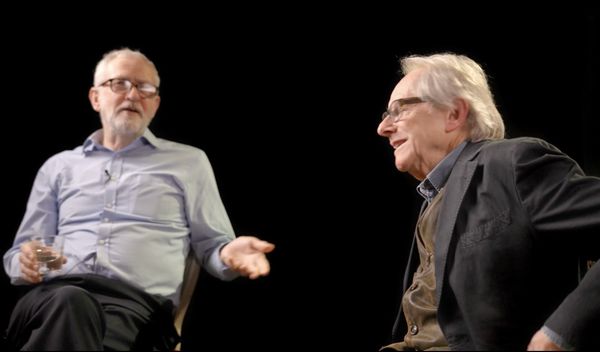Eye For Film >> Movies >> The Bad Patriots (2024) Film Review
The Bad Patriots
Reviewed by: Jennie Kermode

For anybody with a serious political education or an interest in ethical journalism, bearing witness to the monstering of Jeremy Corbyn during his stint as leader of the Labour Party was a surreal experience; still more so the dismissive treatment of Ken Loach, which began in the same year that he won the Palme Do’r for I, Daniel Blake. It’s not that there were never valid reasons for criticism, but the extremity of the overall narrative, and the ubiquity with which it was pursued, verged on the absurd. It was embarrassing to consider what people in other countries might think of it. This documentary, by Victor Fraga, provides, amongst other things, an opportunity to find out.
Fraga is British-Brazilian. Brazil has had more than its share of political turmoil, and the obvious comparisons are drawn here between the treatment of Corbyn and that of Lula, but still he makes no secret of his shock at the phenomenon. Perhaps it’s the contrast with Britain’s carefully constructed image as the birthplace of modern democracy and a champion of liberal freedoms that makes it seem so bizarre. At any rate, he is interested in exploring and responding to it, and does so here by way of a lengthy interview with Corbyn and Loach, who, helpfully, are old friends. it is indeed difficult to imagine material from such an interview being published in a positive light in most British newspapers today, and it certainly wouldn’t find a home on television – but with film, as Loach points out, censorship is usually achieved through financing. Once the product is out there, it’s not as easy to restrict.

As if in anticipation of attacks from political opponents, there’s a commitment to to verité here that leads to some strange decisions, like the keeping in of a section where Corbyn’s mic needs to be adjusted and the conversation accordingly halts whilst the tech crew do their job. This doesn’t really add anything aesthetically or thematically. After an introductory section, we spend most of our time with the three men on an otherwise empty sound stage, but there are also some snippets from Loach’s films to provide variety, and this serves as a reminder of just how long he has spent creating great cinema.
Corbyn sets the stage by discussing some of the wilder stories the press has concocted about him – ones he can easily discount on the basis of verifiable facts, without recourse to political rhetoric. He also references BBC Newsnight’s ludicrous decision to frame him in silhouette, wearing a cap, on a red-tinted background against a picture of the Kremlin – whilst still claiming to be politically neutral. Then there is the claim that he rode a ‘Marxist bicycle’, and it’s hard, despite recent memory, to imagine anyone taking this stuff seriously. The jokes write themselves – or at least, they should. Unfortunately, the film is saddled with satirical narration delivered in such a smug and heavy-handed manner that it makes one cringe to hear it – and not in a good way. Its origin is unclear. Is it drawing on tabloid newspaper reports? As Corbyn reflects on the British establishment’s fondness for playing the man rather than the ball, this feels depressingly similar.
There are a lot of important points made in the course of the discussion – these are, after all, two highly educated and intelligent men, even if Corbyn also sneaks in a bit of gushing about Loach’s work which is closer to fanboy material. Their human moments are endearing and valuable as such. Elsewhere, their intellectual ability fails to mitigate astonishing naivety. One can fully accept the sincerity of their assurances that they do not like Vladimir Putin, yet worry that in discoursing about Russophobia they are doing their opponents’ work for them. Corbyn , in particular, has a dedication to expressing himself freely which thwarts any kind of political strategy.
Sometimes it’s not clear who the film is for. one might well feel relieved just to encounter this effort at balancing what has been said before, but what can it hope to achieve? Loach has spoken eloquently about his politics in the past, putting complex ideas into a form easily accessible to the lay person. There’s some of that here, but, for instance, when the two discuss the common right wing media technique of attacking socialism without ever explaining what it is, it would make the film significantly more useful if, well, they explained what it is, even briefly.
The film ends by addressing the accusations of antisemitism – or of inaction thereon – which Corbyn has faced, and this too is rushed in a way which seems unlikely to convince anybody who did not sympathise with him to begin with. The IHRA definition of antisemitism is addressed in a rather clumsy way and there is speculation on how bad it would be if it were written into law. That is undoubtedly a legitimate point of concern, but it’s also something of a straw man – although it is being incorporated into education guidelines for England and Wales, there is at present no proposed legislation incorporating it.
The Bad Patriots is an important effort to redress the balance and give these two maligned men a chance to put their case. It’s interesting as a reflection on their long years of political activism, and is likely to be historically valuable in that regard. Sadly, though, its lack of rigour and snide approach to those it seeks to challenge result in it falling short of its potential.
Reviewed on: 28 Oct 2024
















